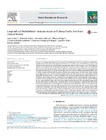Longitudinal Dichelobacter nodosus status in 9 sheep flocks free from clinical footrot
dc.contributor.author
Locher, Iwan
dc.contributor.author
Greber, Deborah
dc.contributor.author
Holdener, Kerstin
dc.contributor.author
Lüchinger, Rita
dc.contributor.author
Haerdi-Landerer, Christina
dc.contributor.author
Schüpbach-Regula, Gertraud
dc.contributor.author
Frey, Joachim
dc.contributor.author
Steiner, Adrian
dc.date.accessioned
2019-12-02T15:49:37Z
dc.date.available
2017-06-11T21:26:58Z
dc.date.available
2019-12-02T15:49:37Z
dc.date.issued
2015-11
dc.identifier.issn
0921-4488
dc.identifier.issn
1879-0941
dc.identifier.other
10.1016/j.smallrumres.2015.10.021
en_US
dc.identifier.uri
http://hdl.handle.net/20.500.11850/107464
dc.identifier.doi
10.3929/ethz-b-000107464
dc.description.abstract
Footrot is a widespread problem in Swiss sheep farming. The objectives of this study were to determine whether flocks which were clinically free from footrot carry virulent strains of Dichelobacter nodosus, and to describe the infection dynamics for flocks and individual sheep. To this purpose, a new PCR-diagnostic tool was used, which is able to distinguish benign from virulent D. nodosus. Nine farms were examined three times at intervals of 6 months. Cotton swabs were used to collect samples from the interdigital skin to analyze for the presence of virulent and benign strains of D. nodosus. Additionally, epidemiological data of the farms were collected with the aid of a standardized questionnaire. On four farms, benign strains were diagnosed at each visit; in one farm, benign strains were detected once only. Two flocks revealed sheep infected with virulent D. nodosus throughout the study but without clinical evidence of footrot. In two flocks, the virulent strains of D. nodosus were introduced into the flock during the study period. In one farm, clinical symptoms of virulent footrot were evident only two weeks after the positive finding by PCR. Only individual sheep with previously negative status, but none with previously benign status became infected with virulent strains during the study. The newly developed competitive RT PCR proved to be more sensitive than clinical diagnosis for detecting footrot infection in herds, as it unequivocally classified the four flocks as infected with virulent D. nodosus, even though they did not show clinical signs at the times of sampling. This early detection may be crucial to the success of any control program. Both new infections with virulent strains could be explained by contact with sheep from herds with virulent D. nodosus as evaluated from the questionnaires. These results show that the within-herd eradication of footrot becomes possible using the competitive PCR assay to specifically diagnose virulent D. nodosus.
en_US
dc.format
application/pdf
en_US
dc.language.iso
en
en_US
dc.publisher
Elsevier
en_US
dc.rights.uri
http://creativecommons.org/licenses/by-nc-nd/4.0/
dc.subject
Sheep
en_US
dc.subject
Lameness
en_US
dc.subject
Footrot
en_US
dc.subject
Claw
en_US
dc.subject
Foot
en_US
dc.subject
PCR
en_US
dc.subject
AprB2/V2
en_US
dc.title
Longitudinal Dichelobacter nodosus status in 9 sheep flocks free from clinical footrot
en_US
dc.type
Journal Article
dc.rights.license
Creative Commons Attribution-NonCommercial-NoDerivatives 4.0 International
dc.date.published
2015-10-24
ethz.journal.title
Small Ruminant Research
ethz.journal.volume
132
en_US
ethz.journal.abbreviated
Small rumin. res.
ethz.pages.start
128
en_US
ethz.pages.end
132
en_US
ethz.version.deposit
publishedVersion
en_US
ethz.identifier.wos
ethz.identifier.scopus
ethz.identifier.nebis
000474092
ethz.publication.place
Amsterdam
en_US
ethz.publication.status
published
en_US
ethz.leitzahl
ETH Zürich::00002 - ETH Zürich::00012 - Lehre und Forschung::00007 - Departemente::02350 - Departement Umweltsystemwissenschaften / Department of Environmental Systems Science::02703 - Institut für Agrarwissenschaften / Institute of Agricultural Sciences (IAS)::08682 - Einheit für Verhalten, Gesundheit und Tierwohl
en_US
ethz.leitzahl
ETH Zürich::00002 - ETH Zürich::00012 - Lehre und Forschung::00007 - Departemente::02350 - Dep. Umweltsystemwissenschaften / Dep. of Environmental Systems Science::02703 - Institut für Agrarwissenschaften / Institute of Agricultural Sciences::03999 - Ulbrich, Susanne / Ulbrich, Susanne
en_US
ethz.leitzahl.certified
ETH Zürich::00002 - ETH Zürich::00012 - Lehre und Forschung::00007 - Departemente::02350 - Departement Umweltsystemwissenschaften / Department of Environmental Systems Science::02703 - Institut für Agrarwissenschaften / Institute of Agricultural Sciences (IAS)::08682 - Einheit für Verhalten, Gesundheit und Tierwohl
ethz.leitzahl.certified
ETH Zürich::00002 - ETH Zürich::00012 - Lehre und Forschung::00007 - Departemente::02350 - Dep. Umweltsystemwissenschaften / Dep. of Environmental Systems Science::02703 - Institut für Agrarwissenschaften / Institute of Agricultural Sciences::03999 - Ulbrich, Susanne / Ulbrich, Susanne
ethz.date.deposited
2017-06-11T21:27:42Z
ethz.source
ECIT
ethz.identifier.importid
imp593653bb87b8918954
ethz.ecitpid
pub:168063
ethz.eth
yes
en_US
ethz.availability
Open access
en_US
ethz.rosetta.installDate
2017-07-25T12:02:51Z
ethz.rosetta.lastUpdated
2019-12-02T15:49:47Z
ethz.rosetta.versionExported
true
ethz.COinS
ctx_ver=Z39.88-2004&rft_val_fmt=info:ofi/fmt:kev:mtx:journal&rft.atitle=Longitudinal%20Dichelobacter%20nodosus%20status%20in%209%20sheep%20flocks%20free%20from%20clinical%20footrot&rft.jtitle=Small%20Ruminant%20Research&rft.date=2015-11&rft.volume=132&rft.spage=128&rft.epage=132&rft.issn=0921-4488&1879-0941&rft.au=Locher,%20Iwan&Greber,%20Deborah&Holdener,%20Kerstin&L%C3%BCchinger,%20Rita&Haerdi-Landerer,%20Christina&rft.genre=article&rft_id=info:doi/10.1016/j.smallrumres.2015.10.021&
Files in this item
Publication type
-
Journal Article [128936]

